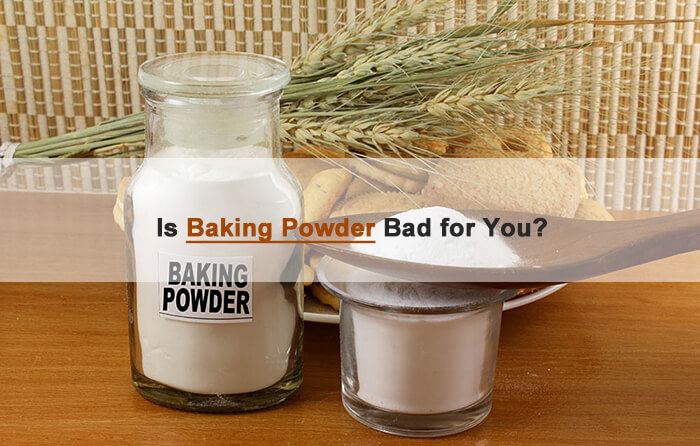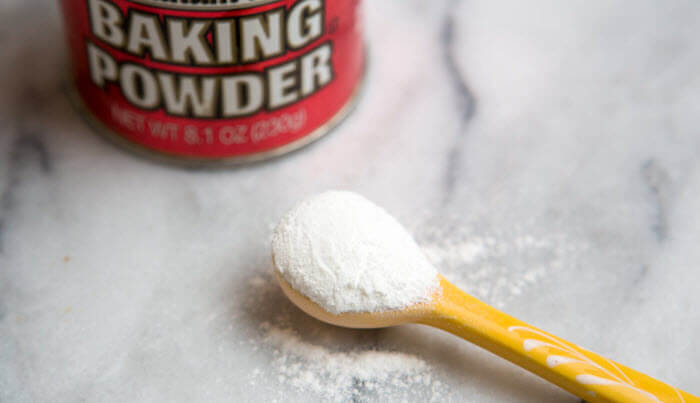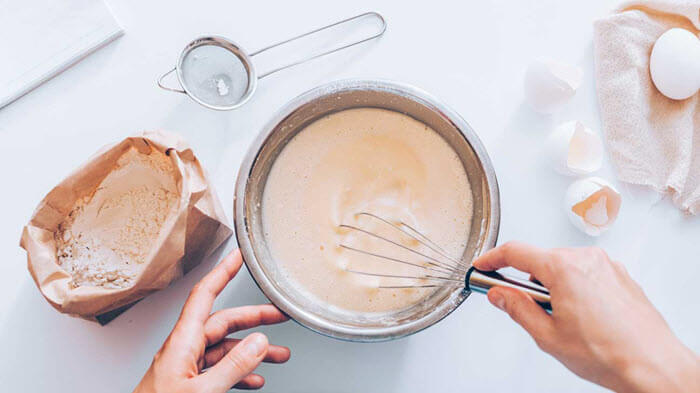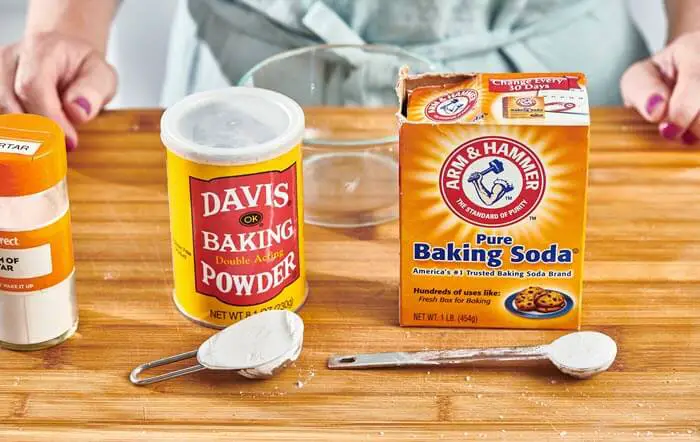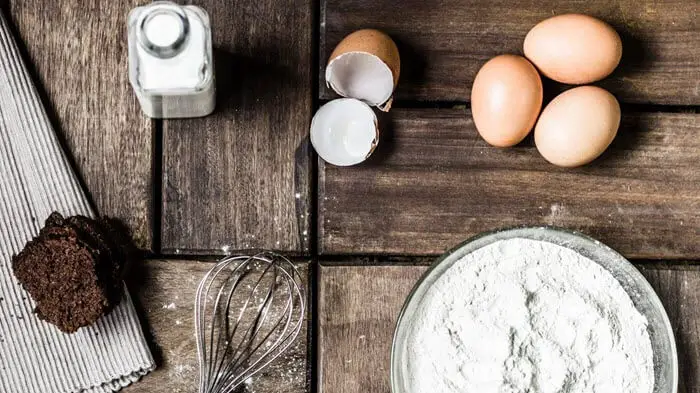Have you ever baked a cake that showed a rapid rise in its volume, but when it came out of the oven, it had a fallen center, sharp, hard crumbs, and a bitter taste?
That happened because you added baking powder improperly. If you are overly familiar with events like that, this article is for you.
Also, if you have wondered, “Is baking powder bad for me?” Then keep reading.
Table Of Contents
15-Second Summary
- Baking powder in the right proportion is not bad for you. However, too much baking powder can cause diarrhea, and vomiting.
- Baking powder can be double-acting or single-acting leavening agents. They both can cause your dough to rise.
- Double-acting baking powder is better, it has a faster action and it lasts longer.
Is Baking Powder Bad for You?
No! In the right proportion, baking powder does not affect the human body.
However, an overdose can react negatively on the body, causing you to experience diarrhea, vomiting, dehydration, etc. Some persons might also have an allergic reaction to the ingredient-baking soda.
Apart from those reactions, baking powder is a fantastic ingredient in baked goods.
What is Baking Powder?
Baking powder is a dry chemical leavening agent that is essential for baking.
An active baking powder contains a cream of tartar(potassium bitartrate), baking soda(sodium bicarbonate), and a moisture absorber, usually cornstarch, to prevent it from reacting.
Baking powder, like yeast, increases the volume of dough or baked goods; unlike yeast, it leaves no fermentation flavor. Baking powder also gives a fluffy and soft texture to baked goods.
To work its “magic,” baking powder has to be wet. Why is this so? Let’s see how baking powder works.
How Does Baking Powder Work?
When added to your dough or batter, baking powder releases a gas known as carbon dioxide (CO2), which produces enough bubbles to cause a rise in the wet mixture.
The CO2 released is obtained by the sodium bicarbonate and tartaric acid reaction found in the cream of tartar present in the baking powder.
What does the CO2 release mean for your dough? It begins to rise!
Why Does Your Batter Taste Bitter, and Why Does it Fall?
Excess baking powder causes a quick rise in your batter. The trapped air gets too large and breaks off, which may result in the collapse of the batter. It also gives your batter a bitter taste due to sodium bicarbonate.
In comparison, when baking powder is added in smaller quantities, it gives your batter a poor volume which may later affect the texture of your baked goods, making them neither soft nor fluffy.
Since we know why your cake falls, what kinds of baking powder are available?
Single vs. Double-acting Baking Powder
Baking powder comes in two types, the single-acting baking powder, and the double-acting baking powder.
Single-acting baking powder and double-acting baking powder are used for the same purpose, which is to cause a rise in volume, but the difference is in their compositions.
Double-acting Baking Powder
Double-acting baking powder comprises baking soda(sodium bicarbonate) and two acids. The two acids present give the dough or batter double chances to rise.
These acids react at different intervals when baking.
- Moisture Induced: The first acid reacts immediately when the baking powder gets wet in the mixture by releasing CO2 that causes it to rise.
- Heat-Induced: The other acid reacts by releasing gases once oven heat is introduced to the batter or dough, making it rise again.
Single-acting Baking Powder
This type of baking powder contains baking soda(sodium bicarbonate) and one acid.
The acid present reacts only once, and that is immediately it becomes hydrated. It is mixed with care as over mixing may take all the gases away, which can cause the dough to fall.
Which Baking Powder Type Is The Best?
Considering the many advantages double-acting baking powder has over the single-acting baking powder, we crown it the best.
The double-acting powder is market-friendly; bakers prefer it over single-acting baking powder. Its leaving strength is faster and works longer, unlike the single-acting powder.
The single-acting baking powder has a shorter shelf life than the double-acting baking powder. It has too many limitations, and in some areas, single-acting baking powder isn’t available anymore.
FAQs About Baking Powder
Can I eat raw baking powder?
Eating raw and dry baking soda is quite dangerous. It can cause the dysfunction of some body parts, like the heart.
Can I use baking soda to substitute for baking powder?
No, you can’t. Baking soda is purely basic, while baking powder contains acid and basic properties.
Using baking soda in place of baking powder will only alter the outcome leaving you with a not so desired taste.
However, homemade baking powder can be considered if cream of tartar is available.
Using a two to one ratio of cream of tartar to dry baking soda can give a homemade baking powder. Still, the homemade baking powder must be used immediately to avoid reacting with itself due to moisture in the environment.
Further reading: What Can You Substitute for Baking Soda in Banana Bread?
Is baking powder with aluminum bad for you?
No. Apart from the metallic aftertaste noticed when used, baking powder with aluminum as one of its ingredients poses no danger to its user.
Aluminum is added to make the batter or dough heat sensitive. It causes an instant rise in volume when introduced to oven heat.
How long is the shelf life of a baking powder?
Depending on its manufacturing company, baking powder can last from six months to two years. Although, some products lose their efficacy with time.
Check if that baking powder in your cupboard is still active as desired.
- Take ½ teaspoon of baking powder, and pour it into ¼ cup of boiling water.
- The presence of bubbles tells you that your baking powder is very active.
Final Words
You don’t want a flat, stiff, flavorless cake on a special occasion. The right amount of baking powder gives a perfectly baked cake.
Keep it far from the reach of children to avoid emergencies.
Ensure that you put the right amount of baking powder into each batter or dough needed. What is stopping you, go on and bake like a pro!
References
- https://en.wikipedia.org/wiki/Baking_powder
- https://www.healthline.com/nutrition/baking-soda-vs-baking-powder

